
Marple Township, Delaware County, PA (February 27, 2025) – Green Amendments For The Generations, Delaware Riverkeeper Network, Citizens for Pennsylvania’s Future, and Clean Air Council, jointly filed an amicus brief in support of intervenors appealing to the Commonwealth Court regarding the Pennsylvania Public Utilities Commission’s (“PUC”) obligation to consider climate change impacts in its environmental reviews pursuant to Article I Section 27 of the Pennsylvania Constitution, otherwise known as the Pennsylvania Green Amendment or the Pennsylvania Environmental Rights Amendment.
The Pennsylvania Green Amendment, first passed in 1971, states that “The people have a right to clean air, pure water, and to the preservation of the natural, scenic, historic and esthetic values of the environment. Pennsylvania’s public natural resources are the common property of all the people, including generations yet to come. As trustee of these resources, the Commonwealth shall conserve and maintain them for the benefit of all the people.” The Amendment was given legal life in 2013 when Delaware Riverkeeper Network, Maya van Rossum – the Delaware Riverkeeper, multiple municipalities, two municipal officials, and a physician used it to challenge unconstitutional pro-fracking legislation known as Act 13.
The amicus brief submitted today is the latest development in the ongoing litigation of Township of Marple v. Pennsylvania Public Utility Commission, in which the Township challenged a PUC-granted petition that exempted PECO natural gas infrastructure from local zoning laws. The Township argued that among other things, the PUC erred when it granted the petition because it declined to consider the potential negative environmental impacts on the public health, safety and welfare of the proposed project; and it challenged the PUC’s finding that the proposed facility was reasonably necessary for the convenience or welfare of the public– which was the basis for granting the petition in the first place.
The case was brought before the Pennsylvania Commonwealth Court, which confirmed in 2023 that the PUC, as is the case with other Pennsylvania government bodies, must ensure that its actions and decisions comply with the constitutional mandates included in the Pennsylvania Green Amendment. As a result, the court vacated the petition and sent the matter back to the PUC with instructions that it issue an Amended Decision “which must incorporate the results of a constitutionally sound environmental impact review as to the proposed siting”. Green Amendments For The Generations, Delaware Riverkeeper Network, Citizens for Pennsylvania’s Future, and Clean Air Council previously filed an amicus brief in support of the intervenors, providing guidance to the PUC on how they may conduct such a review.
Since the first amicus was filed, the PUC has essentially declined to evaluate the climate change impacts of the proposed infrastructure, and has claimed that portion of the review to be the responsibility of the legislature and other state agencies. Once again, the intervenors appealed to the Commonwealth Court challenging this omission from the PUC’s environmental review. The amicus brief filed today details why climate change impacts must be considered in a constitutionally adequate environmental review. It also clarifies that the PUC has an independent obligation to evaluate the climate change impacts where no other agency has reviewed them.
“The Commonwealth Court sent a clear message to the PUC and other Commonwealth agency officials that they must independently and substantially consider the Pennsylvania Green Amendment and the environmental impacts of their projects before they can move forward,” said Maya K. van Rossum, Founder of Green Amendments For The Generations and The Green Amendment Movement, and Leader of the Delaware Riverkeeper Network and the Delaware Riverkeeper. “The PUC must follow through on its constitutional obligations to honor the inalienable rights of Pennsylvanians to pure water, clean air, stable climate, and healthy environments.”
“The PUC failed to complete the task the Commonwealth Court set to it–to perform a constitutionally sound environmental review of the whole project, consistent with its obligations as a trustee of our public natural trust,” said Jessica O’Neill, Managing Attorney for Litigation for PennFuture. “With climate change already substantially affecting the Commonwealth, the implications of climate impacts from this project must not be ignored.”
“With the climate degrading every year, blatantly setting aside our constitutional environmental rights is dangerous and shortsighted,” said Alex Bomstein, Clean Air Council Executive Director. “PUC must remember the public part of its name and its mission to ensure utility service that is both reliable and safe.”
Read the full amicus brief here.
Background: Pennsylvania is one of only three states with a Green Amendment, the other two being Montana and New York. The Amendment gives highest constitutional standing to peoples’ inherent rights to clean air, pure water, stable climate, and healthy environments, and creates an obligation on state governments to consider such protections in all decision-making processes.
The Pennsylvania Green Amendment sat dormant for many years until 2013, when Delaware Riverkeeper Network won a watershed legal victory that struck down pro-fracking legislation that violated the environmental rights that are protected to the highest legal degree in the constitution. This victory inspired the nationwide Green Amendment movement, which now has engagement from over half of the country, including proposed amendments in 19 states and another eight states in the organizing stages.

PENNSYLVANIA (February 13, 2025) – Today, Governor Shapiro announced the filing of a lawsuit against the Trump administration’s unconstitutional freeze of $1.2 billion in Congressionally appropriated federal funds to Pennsylvania programs and organizations. Trump has barred access to funds allocated to support clean energy jobs, environmental and health protections, plugging old leaky gas wells, cutting energy costs for families, and other numerous critical programs.
Clean Air Council’s Executive Director Alex Bomstein issued the following statement:
“The Trump administration has been committing theft at a grand scale, no different than if Washington told your bank to freeze you out of your checking account. Pennsylvanians pay taxes to the federal government and expect services in return. Blocking critical programs such as ones that ensure safe drinking water for Pennsylvania residents is appalling and unconstitutional. We applaud the governor for taking action to protect Pennsylvanians and the programs they rely on daily.”

July 29, 2024 – When climate policy was on the chopping block with the new presidential administration in 2017, Clean Air Council sued the federal government to defend it. At the time, the decision felt bold, but not unsafe. Since then, the landscape has changed. A leading presidential candidate has declared, in allcaps, “IF YOU GO AFTER ME, I’M COMING AFTER YOU!” and has threatened to jail his opponents time and again. Criminal laws against things such as murder have put some modest bounds around what one could imagine the federal government doing to an advocate for a stable climate. Or, they used to.
In June, in what future historians may pinpoint as the moment American democracy went from being in a state of decline to one of sheer freefall, the U.S. Supreme Court decided that there are actually two classes of people in America: the king, on the one hand, and his subjects, on the other. How else to explain it? For the king’s subjects, all criminal laws apply at all times. For the king, however, as long as he is acting “officially,” the criminal laws simply do not apply. Of course, the majority of the Supreme Court used the term “president” rather than “king,” but that is a misnomer; in democracies, no one is above the law.
The talk of murder may strike you as overblown. Three Supreme Court justices did not think so. Justice Sotomayor’s dissent makes the scope of the president’s new powers clear: “Orders the Navy’s Seal Team 6 to assassinate a political rival? Immune. Organizes a military coup to hold onto power? Immune. Takes a bribe in exchange for a pardon. Immune. Immune, immune, immune. … In every use of official power, the President is now a king above the law.”
We know what it looks like in countries where the leaders are not held accountable. It’s very dangerous to defend the land, the people, the climate. Over the last decade, killings of environmental advocates have risen year after year.
In 2013, indigenous land defender Berta Cáceres had been fending off the construction of a hydroelectric dam that threatened the land of the Lenca people. The Honduran military and the dam developers wanted her dead. She told the international press that “I want to live, there are many things I still want to do in this world but I have never once considered giving up fighting for our territory, for a life with dignity, because our fight is legitimate. I take lots of care but in the end, in this country where there is total impunity I am vulnerable… When they want to kill me, they will do it.” And, in 2016, they did.
It’s already a risky landscape for environmental advocates in Pennsylvania. I personally know of people here who have had their cars shot at, their houses vandalized, whom others have tried to run off the road, just for speaking up for their communities. This does not amount to murder. But it’s hard to see the Supreme Court’s decision in Trump v. United States as anything less than an invitation for the next president to go wild. Why, otherwise, would the Court find that the laws criminalizing rape, treason, theft, and—yes—murder no longer need constrain the president?
I am not singling out environmentalists as the sole potential target of a looming revenge agenda. We are all at risk when we all suddenly become part of this new underclass, the subjects of the king.
Berta Cáceres won her campaign in the end. A year after her murder, the backers of the project pulled out, preserving the Lenca’s land. Here in Pennsylvania, we will keep fighting for the clean air, pure water, and healthy climate enshrined in our state constitution, no matter what the federal government does and no matter what the new year brings. But the Supreme Court on Monday was loud and clear: we can’t rely on the law to protect us from an oppressive government. No one can protect us but ourselves. We need to do whatever it takes to keep our society from becoming one that allows presidents to get away with murder. That work starts now.
Alex Bomstein is an attorney and the Executive Director of Clean Air Council, an environmental advocacy nonprofit based in Philadelphia and working across Pennsylvania and beyond.
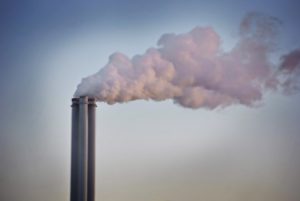
$42 million settlement of Clean Air Act enforcement suit will upgrade Clairton plant, reduce emissions, create public health funds
PITTSBURGH – The statewide environmental groups PennEnvironment and Clean Air Council announced Friday that they will file in U.S. District Court on Monday a proposed consent decree in settlement of their Clean Air Act lawsuit against United States Steel Corporation. If the court, as expected, approves the $42 million agreement, it would resolve a case alleging thousands of violations of air pollution standards that stemmed from a catastrophic 2018 fire and subsequent pollution control system breakdowns at the company’s three Mon Valley Works facilities: the Clairton Coke Works and the Edgar Thomson and Irvin steel mills.
The agreement mandates that U.S. Steel will pay a $5 million penalty — by far the largest in a Clean Air Act citizen enforcement suit in Pennsylvania history, and one of the three largest ever nationally. Most of the penalty money ($4.5 million) will fund public health projects directly benefiting Mon Valley communities suffering from poor air quality near the three U.S. Steel plants.
“Clean air is a right, not a privilege, for all Pittsburghers,” said David Masur, executive director of PennEnvironment, the citizen-based non-profit and state group for Environment America. “This historic announcement shows that we will not sit by while illegal air pollution rains down on nearby communities and the Pennsylvanians who live in them.”
The settlement also includes approximately $37 million worth of pollution control and plant reliability upgrades to prevent future breakdowns of essential pollution control systems. To further reduce toxic emissions, U.S. Steel must permanently close more than 10% of the pollution-spewing coke ovens used to process coal used in steel-making.
“This settlement will achieve the three objectives we had when we filed this case,” said Alex Bomstein, Clean Air Council Legal Director. “First, U.S. Steel must upgrade the aging Clairton Coke Works to reduce toxic emissions and prevent future breakdowns; second, the company must pay a substantial monetary penalty to deter future violations; and third, most of that penalty money will directly benefit the communities suffering from poor air quality near U.S. Steel’s Mon Valley facilities.”
U.S. District Judge W. Scott Hardy cannot approve the settlement until a legally required 45-day waiting period ends. Attorneys for the groups say that the announced sale of U.S. Steel to Nippon Steel Corporation will not affect the settlement. The agreement expressly states that any sale of the company requires the purchaser to agree to assume all outstanding terms, conditions and obligations of the proposed consent decree.
The suit, in which the Allegheny County Health Department (ACHD) intervened as a co-plaintiff, was filed in response to 102 consecutive days of massive, illegal emissions of sulfur dioxide and hydrogen sulfide after a catastrophic fire at the Clairton Coke Works on Christmas Eve in 2018. That blaze, caused by corroded equipment and defective safety systems, knocked out several essential pollution controls at Clairton, which the Irvin and Edgar Thomson steel mills also rely on – yet U.S. Steel continued to run those plants without these legally mandated controls. Violations caused by two subsequent breakdowns at the Clairton Coke Works, in June 2019 and July 2022, were also included in the suit.
The terms of the proposed settlement agreement include:
- The aforementioned $37 million worth of improvements. U.S. Steel spent $17.5 million to replace deteriorating equipment and dramatically upgrade preventive maintenance programs after this suit was filed, and must now complete two additional capital projects, costing approximately $19.5 million, to prevent pollution control outages.
- Payment of $5 million, split between ACHD, the Jefferson Regional Foundation, and Allegheny County Department of Economic Development. The latter groups must use their combined $4.5 million portion exclusively to fund public health programs and air quality improvement projects in the Mon Valley communities affected by U.S. Steel’s emissions.
- U.S. Steel must pay automatic penalties for any future pollution control system outages, no matter the cause. These penalties increase with the seriousness and duration of an outage, to as much as $112,500 per day.
- U.S. Steel must accept more stringent permit limits on the allowable amount of hydrogen sulfide in the treated coke oven gas it uses as fuel.
- U.S. Steel must permanently shut down coke oven Battery 15, which consists of 60 highly polluting ovens – more than 10% of the remaining coke ovens at Clairton Works.
The federal Clean Air Act authorizes private citizens affected by violations of the act to sue violators directly, and to seek civil penalties and court-ordered compliance orders when government regulators have not done so. A separate class action lawsuit, seeking damages on behalf of roughly 100,000 Mon Valley residents for exposure to the excess pollution following the 2018 fire, is currently being litigated in state court.
“The Clean Air Act was created to protect people from threats to the quality of their air, which, in turn, often negatively affect their quality of life,” said Douglas H. Phelps, chair of Environment America’s board of directors. “Our goal with this case was not only to hold U.S. Steel accountable for its illegal pollution, but also to protect people well beyond the Mon Valley by creating an incentive for other polluting companies to keep their neighbors safe.”
Clairton Coke Works and the Edgar Thomson steel mill have long been a focus of the regional environmental community. PennEnvironment Research & Policy Center ranked the Clairton Coke Works as Allegheny County’s worst air polluter in its 2023 “Toxic Ten” study because the facility released more than 1.1 million pounds of toxics to the county’s air in 2021. The Edgar Thomson mill was the only non-power plant ranked in PennEnvironment Research & Policy Center’s “Dirty Dozen” list of Pennsylvania’s top climate-polluting facilities.
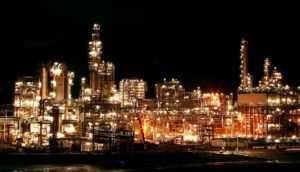
Environmental Integrity Project and Clean Air Council Sue Shell Polymers Monaca Plant Near Pittsburgh to Halt Illegal Emissions of Smog-Forming Pollutants
Pittsburgh — The Environmental Integrity Project and Clean Air Council filed a federal lawsuit against Shell today for repeatedly violating permitted air pollution limits from a massive new plastics production plant northwest of Pittsburgh, which opened last year.
In a lawsuit filed in the U.S. District Court for the Western District of Pennsylvania, the environmental groups called for strict penalties and a halt to the illegal release of smog-forming pollutants from the Shell Polymers Monaca plant in Beaver County, on the banks of the Ohio River.
“Shell received $1.6 billion in taxpayer subsidies from the state to build this plant. The very least this international corporation can do is to follow the law and not make Pennsylvania taxpayers breathe in their illegal pollution,” said Sarah Kula, attorney for the Environmental Integrity Project.
Joseph Minott, Executive Director of the Clean Air Council, said: “Shell’s persistent law-breaking must end. The community will not tolerate dangerous pollution events that risk the health of families across Beaver County and beyond.”
The roughly $6 billion Shell Monaca plant transforms a product of natural gas (ethane), extracted through hydraulic fracturing in the region’s shale formations, into tiny plastic pellets used to manufacture single-use plastic goods like soda bottles and plastic packaging.
The plant has repeatedly violated limits that must be met on a 12-month rolling basis for nitrogen oxide (NOx) and volatile organic compound (VOC) air pollution, which contribute to smog, asthma attacks, and lung disease, according to state records and the lawsuit. The VOCs include benzene, a known carcinogen.
The facility has also shaken the surrounding community by releasing clouds of black smoke from its flares during malfunctions and odors that have caused residents to feel sick.
Pennsylvania Department of Environmental Protection (DEP) records show 12 state notices of air pollution violations at the Shell plant since January of 2022, but no enforcement actions or penalties by the state.
State records also show that Shell submitted 39 reports of malfunctions at the plant during the same time period, including flaring on February 13 that released large plumes of black smoke and flames for hours during an “upset” incident in the ethylene cracking unit.
The most recent problems at the Shell plant include an accident on April 11, when a malfunction at its wastewater treatment plant released high levels of benzene, as measured by fenceline air monitors. The air monitors measured benzene as high as 185 micrograms per cubic meter – which is more than six times higher than federal guidelines for short-term exposure to this pollutant.
Local residents reported strong odors, headaches, watery eyes, irritated throats, and nausea during the benzene release incident.
Because of all the violations and ongoing problems at the plant, the Clean Air Council and Environmental Integrity Project sent a letter to DEP on February 17 urging the state to temporarily halt operations at the Shell plastics plant to protect the health of nearby residents.
The same day, the groups sent Shell a notice of intent to sue for violating, within a few months, the chemical plant’s 12-month permit limit on nitrogen oxides. Previously, the groups sent Shell another notice on February 2 because of other violations of the plant’s air permit, including a violation of prohibition on certain “visible emissions,” including black smoke from flares.
Under the federal Clean Air Act, plaintiffs must send notices of intent to sue at least 60 days before filing a complaint in federal court.
“The repeated and ongoing … violations at the plant harm the health and disrupt the lives of the (Clean Air Council’s) members and other individuals who live, go to school, recreate, and work near the plant,” the lawsuit filed today states.
For a copy of the lawsuit, click here.
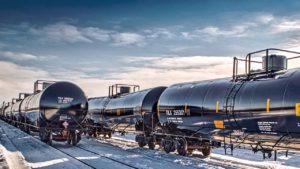
Gibbstown/Wyalusing LNG by Rail permit renewal DENIED by Federal Government
Communities hail decision as justice served after long battle
A Special Permit for the transport of liquefied natural gas (LNG) in rail cars has been denied by the Pipeline and Hazardous Materials Safety Administration (PHMSA) for a proposed project that would export LNG. Environmental and community organizations have fought since 2019 for an end to the authorization for the transportation of the LNG by rail to the proposed Gibbstown LNG Export Terminal on the Delaware River in Gloucester County NJ. A Special Permit (Special Permit DOT-SP 20534), was issued in December 2019 to Energy Transport Solutions (ETS) for transport of LNG by rail car from a proposed LNG processing plant in Wyalusing PA to Gibbstown NJ for export overseas.
Since the permit was issued, public controversy has escalated against the proposed New Fortress Energy (NFE) LNG export project. The transport of LNG from the proposed liquefaction plant in Bradford County PA to the not-yet-built LNG export facility in Gibbstown endangered hundreds of communities along the 200-mile rail route through PA and NJ. This was the first and only use in the nation of DOT 113C120W tank cars to transport LNG, which were not tested or proven safe for LNG and the only permit to allow daily “unit-train” volumes of LNG (up to two 100-car trains every day) over enormous distances from an inland LNG liquefier to a riverfront export terminal. The trains especially threatened communities of color and low-income populations already overburdened with environmental injustices, including Scranton, Wilkes Barre, Reading, Allentown, and Philadelphia in Pennsylvania and Camden and other southern municipalities in NJ. An interactive map shows the rail routes that would have been used.
Municipalities rose up against the proposed rail and truck transport of LNG – a hazardous, flammable, and explosive cargo – through their neighborhoods and towns by passing resolutions in opposition and submitted their adopted municipal resolutions to the agencies and the Governors of their state. Over the years of struggle, more than 100,000 people signed petitions and hundreds of organizations signed letters opposing the LNG transport and calling for PHMSA to pull back their approval. Rallies, press conferences, and special events, all expressed the public outcry against the reckless approval of LNG transport that threatened catastrophe should there be a release of LNG such as in a derailment or accident. A coalition of organizations, including frontline residents from throughout the four watershed states in the Delaware River Watershed, worked to organize and carry out these campaigns to protect our communities and the environment.
The Gibbstown/Wyalusing LNG Project has been delayed, LNG has not been produced and the ETS transport permit was never used. The Special Permit expired November 30, 2021. ETS, a subsidiary of New Fortress Energy, applied for a renewal at that time. PHMSA issued their decision denying the Special Permit renewal request on April 24 in the Federal Register. The brief entry states “SPECIAL PERMITS DATA—DENIED— Permit # 20534–R; Energy Transport Solutions LLC; To renew authorization for the transportation in commerce of methane, refrigerated liquid in DOT specification 113C120W tank cars.
“It’s time for Energy Transport Solutions and New Fortress Energy to pack up and leave our watershed alone. The people have spoken and said no hazardous LNG on our River or through our communities. Now the federal government is lending its voice to say no hazardous LNG on our rail lines. New Jersey, the Delaware River Basin Commission and the Biden Administration now need to join the chorus and ‘just say no’ to LNG,” proclaimed Maya van Rossum, the Delaware Riverkeeper.
“”With this decision we can rest assured that our Communities and Children are safe for now. We will continue our fight until the denial is definite and keep our cities free from the transport of LNG in Pennsylvania, New Jersey, & Puerto Rico,” said Myriam Ramirez, Make the Road Philadelphia.
“PHMSA heard the voices of the thousands who called for the special permit to be denied. The railroad tracks just miles from my home are safer tonight because of it. The number of people who can say the same is staggering. PHMSA did a good thing today, but now it needs to give us the full protection only an outright ban on LNG by rail can provide,” said Karen Feridun, Founder of Berks Gas Truth.
“This decision is long overdue, and provides critical protection for the communities across South Jersey threatened by New Fortress Energy’s Gibbstown export scheme,” said Matt Smith, New Jersey Director of Food & Water Watch. “Now the Biden administration should go further and suspend the Trump era rule entirely, and protect communities across the country from the threats posed by LNG bomb trains.”
“Our communities have spoken loud and clear: we will not stand for the transport of hazardous LNG through our neighborhoods and towns. The decision by PHMSA to deny the renewal of the Special Permit for the transport of LNG by rail is a victory for climate justice and the safety of our communities,” said Eric Benson, NJ Campaigns Director, Clean Water Action. “Deadly gas has no business traveling by rail, road, or by sea. We will continue to remain vigilant and continue to fight to keep where it belongs, in the ground.”
“We are relieved that the permit has been denied because the potential morbidity and mortality that could result from an LNG by rail project is an outrageous risk. In accordance with the precautionary principle, LNG by rail should be prohibited,” said Tammy Murphy, LL.M., Advocacy Director, Physicians for Social Responsibility Pennsylvania.
“South Jersey has already seen the dangerous reality of toxic chemicals on our rails – and what happens when something goes wrong — with the 2012 derailment of vinyl chloride train cars in Paulsboro. That public health disaster had real long-term health impacts for residents, which pales next to the East Palestine rail disaster, a train headed ultimately to a South Jersey plastics plant. South Jersey residents don’t deserve another toxic threat of LNG by rail rumbling through their communities and fueling the climate crisis. This PHMSA decision to deny the special permit is incredibly welcome because it should be another nail in the polluting coffin that would be the Gibbstown LNG facility on the banks of the Delaware; the next step is to finalize LNG-by-rail rules that would stop any community from being subjected to a LNG rail disaster in their backyards,” said Doug O’Malley, Director, Environment New Jersey.
“The idea that we should continue to look further down in the surface of the earth for energy instead of collaborating with China, Russia and other countries is wrong. Learn to compromise and work together worldwide instead of endless competition for energy,” said Fermin Morales, Philly Boricuas.
“Since the permit was issued, public controversy has escalated against the proposed New Fortress Energy (NFE). This extension denial is just another strike against a risky proposal that serves no other purpose than to expand gas extraction in the region to export overseas and leave our communities to bear the risks. Denying this extension casts doubt on the entire New Fortress Energy LNG export project’s future, from the plant in Wyalusing to its reckless and dangerous scheme to move explosive LNG by rail and truck through our communities to the ill-conceived and unwanted Gibbstown LNG export dock terminal in New Jersey. PHMSA took a step in the right direction today, and now we ask President Biden to take the next step – to finalize the LNG-by-rail rules that would halt the transportation of dangerous LNG that would put thousands of people at risk and produce additional air pollution impacting already overburdened communities,” said Anjuli Ramos-Busot, New Jersey Director of the Sierra Club.
“Let’s hope this is one more reason for Wyalusing Township and Bradford County officials to move on from promoting the New Fortress Energy LNG plant, whose threats extend far beyond Bradford County,” said Diana Dakey, facilitator of Protect Northern PA.
“The future of the Gibbstown liquefied natural gas terminal is looking bleaker by the day. The denial of the Energy Transport Solutions special permit is a huge victory for halting this planet-warming, water-polluting, community-endangering fossil fuel project,” said Kimberly Ong, Senior Attorney at NRDC (Natural Resources Defense Council). “Now the DOT just needs to put the nail in the coffin and restore the ban on LNG by rail once and for all.”
“I am extremely grateful that the PHMSA special permit # 20534-R permitting massive rail transportation of Liquefied Natural Gas (LNG) through the Lehigh Valley was denied on April 24, 2023. The initial permit approval was a flawed analysis on both an engineering and emergency response basis. This action is a step forward in protecting the lives of the citizens of Lehigh County and Northampton County from potential catastrophic and possibly deadly rail incidents as well as potentially creating an unsustainable disaster response scenario,” said Bob Elbich, Lehigh County PA Commissioner, Former cryogenic engineer, Former volunteer first responder.
“As part of a small group of residents from West Deptford and National Park NJ who have been fighting this project for 4 years, I am thrilled New Fortress Energy’s permit was not renewed. This is a HUGE WIN for the environment and public safety! We can celebrate today’s victory, but we cannot stop paying attention and speaking up against fossil fuel pollution,” said Jeanne Jordan, concerned citizen.
“Denying this unsafe Trump Era permit that allows gas companies to cut corners when transporting liquefied natural gas is an important milestone in our efforts to protect communities and habitat in the Delaware River Watershed. Today serves as an important reminder that through collective action we can defeat this toxic industry, and we are continuing our work to achieve a nationwide ban on LNG with high spirits.” said Wes Gillingham, Catskill Mountainkeeper Associate Director.
“This an important victory in our battle to stop these LNG bomb trains. After the derailment in East Palestine Ohio, this decision will help prevent a worse disaster. We still have a lot of work to do but this decision will help make our communities safer,” said Jeff Tittel, Environmental Activist. “This a Win for the environment and will help protect us from dangerous LNG bomb trains”.
“The denial of this special permit renewal should be a loud and clear message about the importance of safeguarding all communities from the transport of LNG by rail, many of which along the route to the proposed Gibbstown Export Terminal in NJ are vulnerable, underserved communities. Let the East Palestine derailment disaster be a lesson for the DOT, DOE, and federal agencies moving forward when decision-making. These rail tanks were also bound to South Jersey along the same route and through the same communities with one community that has already suffered from a derailment and release of vinyl chloride. We cannot afford to allow LNG which is more explosive and flammable than vinyl chloride to travel on rail, allow communities to become sacrificial zones, or allow LNG’s entire highly potent methane emitting life cycle to pollute our air now and our future, during fracking, leaks, flares, vents and transport, and during its end use. NJ just adopted the first and only environmental justice law in the nation last week. We must protect all communities and advance rapidly to clean energy to reduce GHGs before the window closes to avoid the catastrophic tipping points and effects of the climate crisis, and meet our climate goals with climate solutions,” said Danielle Plá, Chair, South Jersey Chapter of the Surfrider Foundation
“The denial by the federal government of New Fortress Energy’s permit for rail transport of hazardous, flammable, and explosive liquefied natural gas (LNG) through Pennsylvania and New Jersey provides much needed protection for our communities and environment. The future of our region is more secure as we move closer to completely stopping the pollution and danger posed by the proposed Gibbstown LNG Export Terminal. Once the U.S. Department of Transportation pulls back the federal Trump Rule that allows LNG by rail nationwide, we will begin to loosen the grip of the fracking industry and work positively towards replacing dirty fossil fuels with clean carbon-free renewables and healthy communities. The time to act on the federal rule is now, USDOT!” said Tracy Carluccio, Deputy Director, Delaware Riverkeeper Network.
“This news is a relief and a cause to celebrate. Have people finally come to their senses? I do hope so. The idea that LNG could be safely transported by rail in long trains through very populated areas is misguided, greedy stupidity. Such a plan must never reappear anywhere,” said Marilyn Quinn, New Jersey activist.
“This is encouraging news. We hope it means that PHMSA understands the danger represented by any permit for this route: Shipping LNG on rail lines though our communities simply isn’t safe or acceptable,” said Coralie Pryde, League of Women Voters of Delaware.
“We have been fighting this battle for a long time and we never stopped fighting. We are relieved that PHMSA apparently has made the logical determination that this proposal was just too dangerous for the type of railcars proposed and for the risk it posed to hundreds of thousands of residents along the probable routes. We also hope that PHMSA will use the same logic to stop the transport of LNG nationwide. The same dangers would be amplified by the scale of such a possibility. Given the current state of rail transport, do we really want to make it more deadly?” said Jim Stewart, New Jersey activist.
“The denial of the special permit is an important step toward protecting Pennsylvania communities from the danger of LNG “bomb” trains, putting health and safety over profit. Now we need PHMSA to finish the job by banning the transportation of Liquefied Natural Gas by rail anywhere in the United States,” said Rabbi Julie Greenberg, POWER Interfaith, Director of Climate Jobs and Justice, Philadelphia.
“Trains Gone! People won over Profits! Health and safety is more important. Next, deny trucks! Keep LNG in the ground, where it had been for hundreds of thousands of years!” said David Steinberg, New Jersey activist.
“The denial of this Special Permit for LNG transport comes with a tremendous sense of relief. Aside from the fact that LNG transport presents a risk of leak and explosion, further burdening low-income and BIPOC communities, any permitting of fossil fuel expansion and buildout mustn’t be allowed if we are to achieve net zero and control methane pollution,” said Richard Cole, Co-founder, Philadelphia chapter of Foundation for Climate Restoration.
“PHMSA’s denial of a continued Special Permit to transport liquefied natural gas (LNG) by rail from northcentral PA to South Jersey is a major win for the safety of almost 2 million people who live along the proposed rail route. This move protects the safety of hundreds of communities along the rail route, including many already overburdened by environmental racism, from the threat of catastrophic incidents from transporting dangerous LNG with rail cars that were not designed for that purpose,” said Joseph Minott, Executive Director and Chief Counsel, Clean Air Council
In light of the horrific Norfolk Southern freight train derailment in East Palestine, Ohio on February 3 of this year, it is clear that an overhaul of regulations governing the rail transport of hazardous materials is needed. The derailment and release of vinyl chloride and other toxic materials resulted in human health and environmental disaster for the regional communities in both Ohio and western Pennsylvania. It certainly makes no sense to allow MORE hazardous materials that endanger public safety and the environment onto the rails. In this context, the denial of the Special Permit is obviously logical and necessary.
Yet, there is more to the story and more to be accomplished. On July 24, 2020, PHMSA issued a federal rule that lifted the long-standing ban on LNG transport by rail (Docket PHMSA-2018-0025 (HM-264)). The federal rule authorized the bulk transportation of LNG by rail tank car for carriers nationwide, following a 2019 executive order by then-President Trump directing the Department of Transportation to authorize the movement of LNG by rail car to boost the energy industry and LNG exports (the “Trump Rule”).
The Biden Administration’s PHMSA issued a proposed rule to suspend the Trump Rule (while they research safety issues) with a comment period that closed in December 2021 (Docket PHMSA-2021-0058 (HM-264A)) (the “Suspension Rule”). Yet, a year and 4 months later, the proposed rulemaking to suspend the Trump Rule has not been adopted, despite tremendous public support and expert technical evidence for suspending it and for readopting the complete and permanent ban on LNG transport in rail tank cars. PHMSA has been silent, missing several government deadlines for adopting the Suspension Rule. The STOP LNG by Rail Coalition and people from across the U.S. are calling for the Department of Transportation’s PHMSA to adopt the rule because the transport of LNG by rail is unsafe for people and the environment.
New Fortress Energy can also theoretically still use rail tank cars because the Trump Rule that lifted the LNG by rail ban is still in place. Until the Biden Administration’s PHMSA suspends that rule, if NFE were to have the USDOT specification cars constructed, they could transport LNG in rail tank cars from anywhere through any of our communities, just like companies can throughout the entire nation.
The denial of the Special Permit for the Gibbstown/Wyalusing LNG export project does not kill it for another reason. The loss of the permit is an important stumbling block that could further stymie NFE’s convoluted project, like the delays they have experienced in construction. But the company has said they will move LNG by truck if they must and project that 300-400 trucks each day, 365 days per year, would be needed to get the LNG from Wyalusing to Gibbstown. That’s up to 800 LNG truck trips in and out, on top of all the other trucks going to the Gibbstown Logistics Center to store and export other cargoes such as propane, butane and other products. The increase in truck traffic is already opposed by municipalities and communities that would be in the path of these perpetual truck corridors. For instance, the resolutions passed by municipalities opposing LNG by rail are also opposed to the truck transport of LNG. Hundreds of communities, many with dense overburdened populations, would be impacted by the pollution, noise, and the unending threat of a traffic accident that would release LNG and potentially cause catastrophe with fire, bomb-like explosions, and suffocating vapor clouds. If the company plans to move LNG by tank truck, they will face an intense battle.
Background:
The Special Permit was issued prior to the rulemaking under the Trump Administration that lifted the longstanding ban on transporting LNG in rail cars on the nation’s railways. Special Permits are allowed under a loophole in the federal regulations that govern the transport of hazardous materials on railways. The Special Permit for Gibbstown/Wyalusing was especially egregious because it allowed the use of railcars designed over 50 years ago that had never been used for LNG and never been proven safe to transport the difficult-to-handle cryogenic liquid methane. Just 22 tank cars hold the equivalent energy of the Hiroshima bomb (which is why they are dubbed “bomb trains”).
The Trump rulemaking, even though it is still not considered safe by experts, public commenters, and the STOP LNG by Rail Network, required some upgrades of the tank cars and operational controls, because PHMSA deemed that the old cars, as is, were too dangerous. Apparently, the communities along the rail route for the Gibbstown/Wyalusing LNG where the substandard cars were authorized to travel were offered up as sacrifice zones for New Fortress Energy’s economic benefit. The communities would bear all the risk and all the environmental burden for the company’s export scheme. This fueled the outrage of communities that worked in opposition.
The Trump Rule that lifted the long-standing ban on LNG transport by rail has not resulted in any rail cars being constructed that could be used for LNG transport. This could occur at any time, however, and as long as the Trump Rule is in place, it is a “build it and they will come” situation and an intolerable threat to communities nationwide.
It is unclear why the Biden Administration’s PHMSA issued a proposed rule to suspend the Trump Rule (while they research safety issues) but has not finalized and adopted it. Is it because of the Biden Administration’s agreement to increase LNG exports to Europe due to the Ukraine War and Russia’s militarization of natural gas?
Transporting LNG in rail cars poses unique hazards. If there is a container breach such as a derailment, the super-cooled (-260 degrees F) liquid methane is released as a vapor cloud that is 600-620 times greater than the volume of the liquid, causing freeze burns and robbing oxygen from the air for those in proximity, which in an enclosed space can be deadly. An unignited ground-hugging vapor cloud can move far distances, with movements that are difficult to predict. If ignited, the fire is inextinguishable and the resulting pool fire is so hot it can cause skin burns in seconds. An LNG release can cause an explosion if confined in a space such as a sewer or building. It can result in a powerfully destructive Boiling Liquid Expanding Vapor Explosion. The emergency response to a broken cryogenic tank car is problematic for first responders and fire companies and risks catastrophe due to variable conditions that can influence the vapor cloud movements, the potential for explosions and the devastation of quickly spreading hot fires. These public safety hazards are some of the reasons LNG transport by rail car was banned.
LNG is liquefied methane. Methane is a greenhouse gas (GHG) 86 times more powerful than carbon dioxide in heating the atmosphere on a 20-year time scale and 104 times more powerful over a 10-year period, the periods of time when scientists say we must reduce GHG emissions to address the climate crisis. Methane leaks and/or is vented in all phases of the LNG production process, including storage, transport, transloading and use. The Biden administration has pledged to slash methane emissions to reduce the GHG emissions that are driving the world towards exceeding the 1.5 degree C limit that the UN IPCC Working Group has set as critical and that nations have pledged not to exceed. Pushing LNG onto train tracks, enabling export of LNG overseas, which increases dependence on fossil fuels rather than supporting Europe’s investment in carbon-free renewables, and stepping up gas extraction in Pennsylvania does the opposite.
###
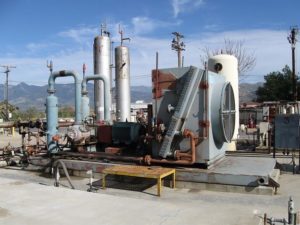
Compressor Station May Go Forward Court Rejects Adelphia’s Attempt for a “Do-Over” in Federal Court After Losing at Commonwealth Court
(WEST ROCKHILL TOWNSHIP, BUCKS COUNTY – March 14, 2023) Notch another win
for Citizens in the long-running saga of the Adelphia Gateway Quakertown Compressor Station,
a significant industrial pollution source on a small property amidst houses and farms in this rural
community. The federal Third Circuit Court of Appeals, one step below the U.S. Supreme
Court, ruled today that Adelphia Gateway was not entitled to a different outcome in Federal
Court after receiving an adverse judgment in the Commonwealth Court of Pennsylvania in Cole
et al v. Department of Environmental Protection in 2021.
That case resolved in the affirmative the question of whether state permits issued for operations
which are part of interstate natural gas pipelines can be appealed at the Pennsylvania
Environmental Hearing Board (EHB). Neighbors have been seeking to present their case to the
Board since 2019 that the natural gas compressor station’s technologies and processes are
insufficiently protective of the environment and public health.
Neighbors Clifford Cole, Pamela West, Brian Weirback, Kathy Weirback, Todd Shelly, and
Christine Shelly oppose the DEP permit, an air quality Plan Approval, which would allow
Adelphia to emit hundreds of tons of air pollution into the community. The neighbors also
object to the droning industrial noise the station projects onto their quiet and peaceful properties.
Adelphia Gateway has maintained from the outset that the federal Natural Gas Act allows only
the federal Circuit Courts of Appeals to hear a challenge to a state permit issued to an interstate
natural gas pipeline-related pollution source. In 2021, the Pennsylvania Commonwealth Court
rejected that argument, stating that the EHB could hear the Neighbors’ appeal. In 2022, the
Federal District Court for the Middle District of Pennsylvania also rejected Adelphia’s
Complaint and request for an Injunction to prevent the Commonwealth Court’s ruling allowing
the EHB case to proceed. Adelphia appealed that decision to the Third Circuit, resulting in
today’s outcome.
The Third Circuit’s decision recognized the state court’s authority to rule on a question involving
interpretation of federal law (whether the Natural Gas Act preempts a state administrative
proceeding), accords respect to the state court decision, and further held that federal court could
not subsequently take up and rule on the same question involving the same parties.
As the Court stated: “When a party has its day in state court and loses, it is not permitted a do-
over in federal court. Were it otherwise, state court decisions would lack finality, litigation expenses would balloon, and lower federal courts would sit as quasi courts of appeals over state
courts.” Opinion, p. 16.
This outcome is particularly noteworthy given that the Third Circuit is the very court the Natural
Gas Act would ostensibly place sole jurisdiction for Court appeals of state permits. It has been
further established now that this preemption of review does not apply to state administrative
proceedings, such as those before the EHB. The case is of considerable legal interest because of
the broad implications for the application of state law in Pennsylvania, and potentially
neighboring states as well, in the context of a critical environmental struggle–the ongoing
development of Marcellus Shale natural gas fields in Northeast and Southwest portions of the
state and the pipeline networks necessary to support that exploitation.
“The Third Circuit today made it clear—appeals to the EHB in PA are not preempted by the
federal Natural Gas Act. This is a major win for the people of Pennsylvania resisting the
intrusion of gas industry polluters in their communities,” said Michael D. Fiorentino, attorney
for the Neighbors. “Citizens contending with natural gas pipeline facilities setting up in their
communities need the option for a robust, fact-finding appeal of DEP permits that are available
only before the Environmental Hearing Board.”
“That a few citizens could continue to win in state and federal Courts against the massive gas
industry is astounding,” said Pamela West, one of the neighbor-parties to the appeals. “We will
continue to strive to protect our families, the nature we are part of, our homes, and the quality of
our lives.”
“We shouldn’t give up the fight against big corporations when it comes to our family’s health,
safety and the future of our environment. If we don’t stand up, who will? We will continue to do
what we can to make a difference.” ~Brian and Kathy Weirback, neighbor-parties to the
appeals.
In the near future, it is expected that the PA Supreme Court, at which Adelpia had lodged yet
another appeal, will determine whether to also uphold the Commonwealth Court decision and
allow the EHB to re-establish a procedural timeline for the Neighbors’ challenge to the air
quality plan approval.
Today’s decision can be found on the Third Circuit docket for Adelphia Gateway, LLC v.
Pennsylvania Environmental Hearing Board, et al, No. 21-3356.
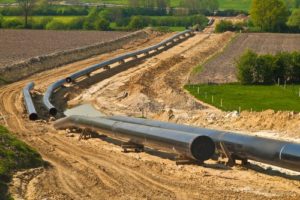
HARRISBURG, PA (February 22, 2023) – Today, the Pennsylvania Supreme Court handed down a major decision in two suits where the public sought reimbursement for legal costs in environmental cases: the Clean Air Council, the Delaware Riverkeeper Network, and Mountain Watershed Association v. DEP and Sunoco Pipeline and Gerhart v. DEP and Sunoco Pipeline cases.
The Supreme Court’s decision reversed a lower court ruling that had put up a major barrier to reimbursement of legal costs for environmental lawsuits brought by non-profits and residents. Now, members of the public, who are harmed by permits allowing industrial activities, and who successfully appeal those permits, are more easily able to get reimbursement of their legal costs. The reimbursement can come not only from the state, who issued the permit, but from the company holding the permits, and profiting from the permitted activity. Legal experts, fees, and other costs necessary for these cases can easily reach tens or hundreds of thousands of dollars, and the cases can go on for years or even decades, making appeals like this out of reach for most absent the ability to recoup costs.
The decision is a victory for the environmental organizations, who had sought but been denied reimbursement for their legal costs from Sunoco Pipeline, the builder of the controversial Mariner East pipelines. It is also a victory for the Gerhart family, landowners along the pipeline route who stood up to the company and also had success at the Pennsylvania Environmental Hearing Board.
“Today’s ruling from the Pennsylvania Supreme Court is a huge win for the public,” said Joseph Minott, Executive Director and Chief Counsel of Clean Air Council. “Too often, when members of the public have been harmed by big polluters, they are unable to afford legal support. Today’s ruling makes it easier for the public to be compensated for their legal costs when their lawsuits are successful. This opens the door for the public to finally have their day in court and for justice to be restored.”
Melissa Marshall, Community Advocate with the Mountain Watershed Association stated, “We are pleased with the decision for two reasons. Not only does it remedy a bad standard, but it also clarifies, for the first time, that it is the permittees – often exploitative industries, such as mining and fracking — and not just the taxpayers, who should bear the financial burden when environmental groups bring protective lawsuits.”
“Today’s decision appropriately recognizes the significant role that citizen objectors play in the vindication of environmental rights and the General Assembly’s laws protecting the public natural resources. This ruling helps support legal action against bad permitting decisions, and holds accountable the parties who stand to benefit financially from those decisions,” said Kacy Manahan, Senior Attorney for the Delaware Riverkeeper Network.
“Today’s opinion shows that Pennsylvanians who enforce the Clean Streams Law have a voice and that applicants who submit faulty permit applications to DEP can be held responsible for their sloppy or incompetent work,” said Rich Raiders, attorney for Stephen and Ellen Gerhart, Huntingdon County landowners who won a fee award from DEP, but not Sunoco, in a case decided with the Clean Air Council matter in today’s opinion. The Gerharts successfully challenged a wetlands determination on their Huntingdon County property where Sunoco was required to remediate a parcel of forested wetland disturbed during construction.
In March of 2022, Clean Air Council, Mountain Watershed Association, and the Delaware Riverkeeper Network petitioned the Pennsylvania Supreme Court to overturn that lower court decision, which made it nearly impossible for residents or advocacy organizations to be compensated for their legal expenses from the permit holder when appealing a DEP permit. The Commonwealth Court decision affirmed the Environmental Hearing Board’s decision that denied the groups’ request for Energy Transfer (Sunoco Pipeline’s parent) to compensate parties for their legal fees stemming from an appeal of Sunoco’s Mariner East 2 pipeline permits.
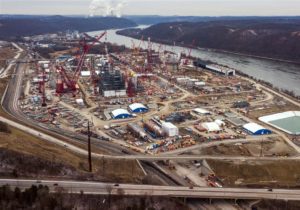
Pittsburgh, Pa. – Today, the Environmental Integrity Project and Clean Air Council filed a notice of intent to sue a petrochemical plant in Beaver County, about 30 miles west of Pittsburgh, for repeated violations of air pollution limits.
The action against Shell Chemical Appalachia’s plant, located in Potter Township, is for illegal emissions of volatile organic compounds (or VOCs), which contribute to smog and can cause nausea, nerve damage, and other health problems, as well as nitrogen oxides, which can trigger asthma attacks and respiratory illness.
Under the federal Clean Air Act, plaintiffs must send notices of intent to sue at least 60 days before filing a complaint in federal court.
“Shell has blown through permit limits in the first few months of operation, putting nearby communities in harm’s way,” said Sarah Kula, Attorney for the Environmental Integrity Project. “Shell must be held accountable under the law and take appropriate steps to prevent illegal pollution going forward.”
“Shell’s exceedances are not just numbers in a book, they are tons of pollution that can harm and even kill people,” said Joseph Minott, Clean Air Council Executive Director and Chief Counsel. “We can’t allow these pollution events to become the cost of doing business. There must be strict penalties to deter this clear violation of the laws.”
In September 2022, the plant, called Shell Polymers Monaca, emitted 512 tons of VOCs, nearly reaching the 12-month permitted limit of its approved VOC emissions (516.2 tons of VOCs in any consecutive 12-month period) over the course of a single month, and all but guaranteeing ongoing VOC permit violations deep into 2023.
Shell also emitted nitrogen oxide (NOx) and carbon monoxide (CO) from sources at the plant in the final months of 2022 at rates that exceed permit limits, according to the notice of intent to sue.
In addition, public records show that Shell released soot and other “visible emissions” that violate limits in its permit and the Clean Air Act. The law prohibits visible emissions from flares and incinerators at Shell’s plant that exceed 0% opacity, including plumes of black smoke, for more than five minutes during any consecutive two-hour period.
For a copy of the notice of intent to sue, click here. To view the accompanying exhibits, click here.
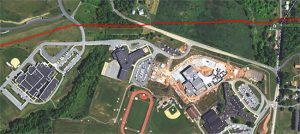
Chester County, PA (August 16, 2022) — Highly volatile hazardous liquids surge through the Mariner East pipeline system as it snakes through over 300 miles of Pennsylvania’s land. It passes by schools, under farms, and across streams. Existing lax regulations could not prevent Sunoco Pipeline L.P.’s reckless construction practices from creating sinkholes by homes and train tracks and contaminating residential water supplies, nor make Sunoco provide basic safety information to schools and communities in the zones threatened by potentially catastrophic leaks or explosions.
The Council, other local health and environmental groups, and impacted residents have worked tirelessly for years to protect the public and hold Sunoco accountable. We now applaud the Public Utility Commission (PUC) for stepping up with proposed common-sense rules to reduce the threat from hazardous liquid pipelines. Sunoco and other industry actors are trying to block the PUC’s proposed safety regulations, but the Council is meeting them at every turn, fighting Sunoco in court when local communities sue for relief, amplifying the voices of the public, and supporting the PUC’s invaluable efforts.
One of the most important proposed regulations would help prevent sinkholes and potential pipeline ruptures by requiring pipeline builders to look at the geology of a site before starting construction. Pennsylvania’s unique geology includes unstable limestone formations, called karst. These pipelines carry volatile gasses that are compressed under great pressure into liquid. If the pipelines rupture, heavier-than-air gasses would rapidly blanket the surrounding area, potentially suffocating anyone in range, and the slightest spark could ignite the highly flammable gasses. So, it seems obvious to avoid building where the ground might crumble away, leaving the pipeline unsupported. Yet Sunoco historically neglected to adequately check its construction sites, too often with disastrous results, and now fights this necessary rule.
The PUC also wants to require pipeline operators to provide local officials and emergency responders with the information they need to protect their communities in the event of an accident. The Council strongly supports providing all the information needed to local officials charged with protecting schools in the potential impact zone of a pipeline leak or other accidents. Previously, Sunoco provided such limited information to local community members that it left them quite unprepared for a pipeline disaster. For instance, the company left residents confused about when they should call “911” because a cell phone might produce a catastrophic spark.
The Legal Exposition
Buckle in for some legal exposition identifying what has happened and what still needs to happen before PUC’s proposed safety rules start protecting Pennsylvanians. Administrative regulations like these must go through several steps before being finalized, including opportunity for the public to submit comments. Here, the PUC decided to also invite a second round of comments to allow members of the public to respond to each others’ initial remarks. The rulemaking attracted comments from a wide range of interested parties, ranging from residents to local government officials to the American Petroleum Institute (the national trade association for the fossil fuel industry), and, of course, Sunoco.
In addition to raising public awareness during this process, the Council led a coalition of other knowledgeable public advocacy groups in drafting comments which (1) supported the PUC’s authority; (2) suggested ways to strengthen the proposed rules, including grounding the regulations in well established industry “best practices” which are too often ignored; and (3) bolstered the voices of local communities. In the second round, our coalition refuted the many baseless objections raised by Sunoco and their allies and provided further support for the concerns of local governments and nearby residents.
The comments and the proposed rules were then reviewed by Pennsylvania’s Independent Regulatory Review Commission (IRCC), as is standard. IRCC then prepared its own comments, referencing public comments and asking the PUC to conduct additional analysis.
What are the next steps
PUC must consider and publish a response to all of the comments before drafting a final form of the rules which it needs to send back to the IRCC. The PUC has two years from when the public comment period closed to complete the process, which makes the deadline May 12, 2024. IRCC will then discuss the rules at a public hearing and vote on whether the rules are “in the public interest.”
In the meantime, Clean Air Council will be part of the bulwark protecting the communities that brought successful challenges to some Sunoco’s harmful practices. Sunoco’s legal challenges to the PUC’s orders that resulted, combined with their public comments to the rulemaking, foreshadow their likely future judicial challenges to the safety rules. For instance, Pennsylvania law charges the PUC with ensuring that public utilities are operated safely and efficiently, making “every reasonable effort to warn and protect the public” from potential dangers. Sunoco argued strenuously for public utility status for its hazardous liquid pipelines because that allowed it to use the power of eminent domain to condemn private property to build its pipelines. Now it argues in public comments and in court that it should not need to accept the associated responsibilities. Astoundingly, in fighting these regulations Sunoco is essentially claiming that, in the event of a Sunoco-created pipeline emergency, it would be an unreasonable effort for Sunoco to 1) warn the officials in charge of keeping nearby school children safe, and 2) provide basic information public officials need to develop emergency-response plans to protect the children and others.
Clean Air Council will not let such claims stand. The Council will continue to fight Sunoco’s obstructionist, irresponsible behavior in court and through the regulatory process. It looks forward to reporting when the PUC’s new regulations are finalized and begin making Pennsylvania safer.
For more information, contact Annie Fox, Law Clerk at afox@cleanair.org.

